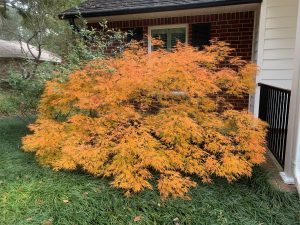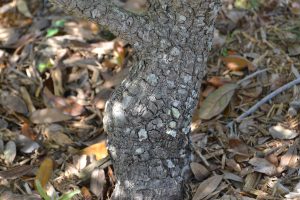When looking for a small tree that provides a visual impact in the landscape, nothing beats a Japanese maple.
In North Florida, we have landscapes with some suitable conditions for growing a Japanese maple but these trees are not for every site. Japanese Maple plants prefer some shade, especially in the afternoon, and protection from winds. If you have a high tree canopy that allows for filtered sun throughout the day, many cultivars will grow well with this light. Soils should be moist but well drained with good organic matter. Areas with higher pH soils such as home foundations or around concrete patios usually show plants with poorer growth and nutrient issues.

This specimen is suited to its spot with acid soil with a high Live oak tree canopy. The fall color is beautiful. Photo by Beth Bolles, UF IFAS Extension Escambia County.
Many people love the leaf color of Japanese maples, either burgundy leaf forms or selections with beautiful fall color. The palmate leaf shape also adds interest, along with varying degrees of coarse to finer textures.
My favorite characteristic of the Japanese maple is the growth form. Trees often have a layered appearance with branches extending outward, making a beautiful small canopy. Many selections have smooth bark but one cultivar, the Pine bark maple, has plated bark that looks like a pine tree.

Pine bark Japanese maple form and fall leaf color. Photo by Beth Bolles, UF IFAS Extension Escambia County.
Although the growth rate is slow to moderate, be sure to research the plant size of the cultivar you want. There are small tree forms that will reach an average of 20 feet and plants that only grow about 5 feet in twenty years. Our cool season is the best time to plant a Japanese maple if your landscape is suited for this tree.
- Gifts from the Garden - January 15, 2026
- A Plant From My Past - January 8, 2026
- Garden Spider Egg Sacs - October 23, 2025

